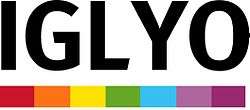IGLYO
 | |
| Type | Non-governmental organization |
|---|---|
| Headquarters | Brussels, Belgium |
Membership | 91 member organizations |
Co-Chairs |
|
Main organ | IGLYO General Assembly |
| Affiliations | ESU, EYF |
| Website |
www |
The International Lesbian, Gay, Bisexual, Transgender, Queer & Intersex Youth and Student Organisation (IGLYO) is an international LGBT organisation that was created in 1984 as a reaction to the need for better cooperation among regional, local and national LGBTQ youth and student organisations.
IGLYO is a membership-based umbrella organisation that aims to empower and enable its members to ensure representation of LGBTQ youth and student issues. IGLYO advocates on behalf of members to international bodies, institutions and other organisations.[1]
IGLYO is led by an elected Executive Board who are mandated by the General Assembly, which is the highest decision making body of the organisation. Executive board members serve for a two-year mandate. The Executive Board is supported by a secretariat in Brussels, Belgium and led by two co-chairs.
IGLYO has more than 80 member organisations in more than 40 countries and celebrated its 30th anniversary in 2014.[2]
Executive Board
Members of the Executive Board are elected by the IGLYO General Assembly for a two-year term, and is tasked with carrying out IGLYO’s Annual Work Plan as approved by the General Assembly. Half of the Board rotates every second year to ensure its sustainability and continuity. Each IGLYO board member has a specific focus area and it is led by two Co-Chairs.
| Title | Name | Country |
|---|---|---|
| Co-chairs | Ksenija Joksimovic | |
| George-Kyveli Papadimitriou | ||
| Board Members | Elin Lilijenbladh | |
| Sabine Tropa | ||
| Julia Kata | ||
| Hakan Özkan |
Capacity Building
IGLYO organises annual conferences, study sessions and seminars facilitating the capacity building of youth activists and organisations on different themes. Such events are organised to contribute to promoting values of acceptance and non-discrimination, and for an increasing participation of young LGBTQ people in democratic decision-making processes. Some conferences focus on thematic areas, such as education, social inclusion and intersectionality, while others concentrate on the skills important for organizational development. All events work to build the individual capacity of participants who then apply the skills to their work back home, acting as multipliers of information and knowledge.[3]
Advocacy
IGLYO advocates on behalf of all of its member organisations to European and international institutions. Headquartered in Brussels, IGLYO is situated to lobby EU decision makers on issues affecting LGBTQ young people.
By identifying and creating opportunities to highlight the concerns of LGBTQ youth and students, IGLYO ensures that the needs of LGBTQ young people are considered in EU policy decisions.
IGLYO cultivates relationships with officials at the European Commission, members of the Intergroup on LGBT Rights at the European Parliament, and certain Permanent Representations to the Council of Ministers of the European Union- including the six-month rotating Presidency of the Council. IGLYO also works closely with the Council of Europe. IGLYO is active member of the European Youth Forum, ILGA, ILGA-Europe, the Euromedplatform,[4] and is an associate member organisation of the European Students' Union.[5]
References
- ↑ . IGLYO http://www.iglyo.com/about/.
|first1=missing|last1=in Authors list (help); Missing or empty|title=(help) - ↑ . IGLYO http://www.iglyo.com/about/members/.
|first1=missing|last1=in Authors list (help); Missing or empty|title=(help) - ↑ . IGLYO http://www.iglyo.com/what-we-do/capacity-building/.
|first1=missing|last1=in Authors list (help); Missing or empty|title=(help) - ↑ . IGLYO http://www.iglyo.com/what-we-do/advocacy/.
|first1=missing|last1=in Authors list (help); Missing or empty|title=(help) - ↑ "International Lesbian, Gay, Bisexual, Transgender and Queer Youth and Student Organisation". Associate Members. European Students' Union. Retrieved 6 May 2016.
